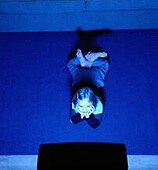
MONDAY, Feb. 18 (HealthDay News) — Two studies, one from the United States and the other from New Zealand, add more fuel to the long-standing claim that exposure to television — especially violent TV — can harm children.
The studies aren’t definitive, however, and each offers a different view of TV’s impact on kids.
The New Zealand study, for example, looked at a group of children who grew up to have a high rate of criminal convictions and found those who watched the most TV had the most problems.
In the American study, however, preschool children randomly assigned to watch educational and “pro-social” shows appeared later to be better behaved than kids who watched regular programming.
“It’s not just the bad behaviors that they get from TV. They can get good behaviors, too,” said the U.S. study’s lead author, Dr. Dimitri Christakis, director of the Center for Child Health, Behavior and Development at Seattle Children’s Research Institute.
For a variety of reasons, researchers have had a hard time figuring out whether TV is actually harmful to kids. If children watch a lot of violent TV and then misbehave or become violent, it could be because they’re naturally drawn to that kind of programming and not directly influenced by it, experts say. Or something else, such as parenting or genetics, could explain things.
The New Zealand study tracked 1,037 children into adulthood (age 26) to see what happened to them. They were born in 1972 and 1973 in Dunedin on New Zealand’s South Island.
The investigators found that those who watched the most TV when they were between the ages of 5 and 15 grew up more likely to have a criminal conviction or have an antisocial personality disorder. The study doesn’t definitively prove that watching TV caused criminal activity or aggression, but the researchers found that other factors (including poverty levels and IQ) didn’t play a role.
“The findings support a lot of other research that indicates that watching a lot of television in childhood can lead to antisocial behavioral problems later in life,” said study co-author Dr. Bob Hancox, an associate professor in the department of preventive and social medicine at the University of Otago in Dunedin.
The study is unusual because 27 percent of the males had a criminal conviction by age 26, and a remarkable 19 percent of them were convicted of a violent crime. Hancox, however, said the researchers don’t think these numbers are especially high.
The study authors don’t know if the television that the children watched was especially violent; the country only had two channels at the time, and many shows were from overseas, Hancox said. “We cannot say from our study whether it is the violent content or just watching TV that is most important,” he added.
In the U.S. study, the Seattle researchers analyzed what happened to 565 kids aged 3 to 5 who were randomly assigned to watch either regular programs on TV or educational and “pro-social” programming. In essence, the idea was to substitute shows like “Mister Rogers’ Neighborhood” for “Power Rangers,” Christakis said.
After six months, those who watched the educational programming scored better on a test of “social competence and behavior” that was given to their parents.
It’s not clear what the score difference made for the children in real life. However, the tests aimed to examine things such as whether kids are cooperative, non-aggressive and non-argumentative.
Christakis noted that these traits aren’t signs of docile children. “I view them as desirable,” he said.
The big message is that the kind of television that kids watch matters, he added.
“All television is educational. It’s just a matter of what it’s teaching,” Christakis said.
In an editorial accompanying the studies, which are scheduled for publication in the March issue of the journal Pediatrics, Dr. Claire McCarthy of Boston Children’s Hospital and Harvard Medical School, echoed that thought.
Reiterating the American Academy of Pediatrics’ long-standing recommendation of limiting kids’ TV time to no more than two hours a day, she said, “It is time to change our approach.”
McCarthy explained that “We need to switch our emphasis to outcomes and not screen time, because it is outcomes that matter. . . . It is a variation on the ‘if you can’t beat ’em, join ’em’ idea. If the screens are going to be on, let’s concentrate on the content, and how we can make it work for children.”
More information
The U.S. National Library of Medicine has more about television watching.

